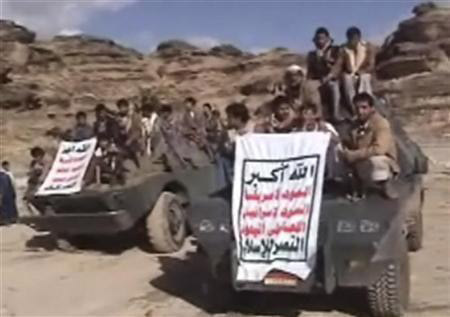Yemeni Shi'ite rebels said on Tuesday they had withdrawn from Saudi soil as part of a truce offer extended to the oil giant after months of border fighting, Reuters reported.
The pullout could not be independently confirmed.
Rebel leader Abdul-Malik al-Houthi, whose fighters have been battling both Saudi and Yemeni government forces, made the ceasefire offer on Monday. Riyadh has said it is considering it.
"There has been a complete withdrawal from all Saudi positions and territory," the rebels said on their website.
Yemeni tribal sources alongside the Yemeni government denied the rebels had withdrawn.
The rebels said Saudi air strikes had killed five people and wounded two on Monday evening. They did not specify whether the strikes had occurred before or after the truce offer, which was made before a conference in London to galvanize support for Yemen as it tackles militancy.
Saudi defense ministry spokesman General Ibrahim al-Malek said: "The truce offer is being examined and we will make an official decision later today."
Yemen's government has been fighting the rebels on and off since 2004. The conflict intensified last summer when Sanaa launched Operation Scorched Earth to quash the latest upsurge in violence.
Saudi Arabia stepped into the fray in November when rebels seized some Saudi territory, prompting Riyadh to wage an offensive against them.
Rebel leader Houthi said he was offering a truce "to avoid more bloodshed and to stop aggression on civilians."
But he warned Riyadh that if Saudi Arabia did not also end hostilities, rebels would wage an "open war" on the kingdom.
Violence flared in northern Yemen, with Yemeni sources saying government forces had killed 20 rebels in clashes that also killed four Yemeni soldiers.
The conflict raging in north Yemen has displaced around 200,000 people, according to the United Nations. The International Committee of the Red Cross (ICRC) said on Monday humanitarian conditions in northern Yemen were worse than ever.
In the continued separatist-inspired unrest in the south, a senior local police commander was shot dead on Tuesday as armed protesters clashed with security forces in al-Mahrah province and five demonstrators were wounded, residents said.
There was no immediate report of the incident on state media.
FAILED STATE?
Yemen is also in the throes of a crackdown on the resurgent regional wing of al Qaeda, which is based in the country.
Yemen's foreign minister said the country was at risk of becoming a failed state unless foreign powers helped it develop its economy so that young people had alternatives to a path of radicalization.
Abubakr al-Qirbi made the remarks in an interview with Reuters before a meeting on Wednesday in London where foreign ministers of Western powers, Gulf states, Egypt, Jordan and Turkey will discuss ways to stabilize Yemen.
"The actual fact is that the economic problem is the major cause of all the ills Yemen is facing now," Qirbi said.
"I hope it will not become a failed state, there is a risk of course, but I think a component is how much the Yemenis will rise up to the challenges and really move away from political squabbling," Qirbi said.
A Yemeni court jailed seven people for five to 10 years on Tuesday after convicting them of belonging to al Qaeda.
The government in Sanaa declared open war on al Qaeda this month, stepping up air strikes and security sweeps after the Yemen-based regional arm of al Qaeda said it was behind a failed December 25 bid to blow up a U.S.-bound airliner.
Western powers and Riyadh fear Yemen will become a failed state, allowing a resurgent al Qaeda to exploit chaos and use the country as a base for more international attacks.
Qirbi earlier told the BBC his country needed logistical support to help fight al Qaeda but would not allow foreign covert operations or a U.S. base on its territory.
He said Yemen had mistakenly allowed foreign intervention in 2002, when a U.S. missile strike killed an al Qaeda leader suspected of planning the 2000 suicide bombing of the U.S. warship Cole.
"It proved to be a terrible mistake, and this is why we don't want to repeat it. We have to do it ourselves and anybody who is interested will have to support us," Qirbi said.
Washington is considering proposals to sharply expand Pentagon powers to assist forces in Yemen and U.S. defense and counter-terrorism officials say Washington has been quietly supplying military equipment, intelligence and training to the government there to help it destroy al Qaeda hide-outs.






